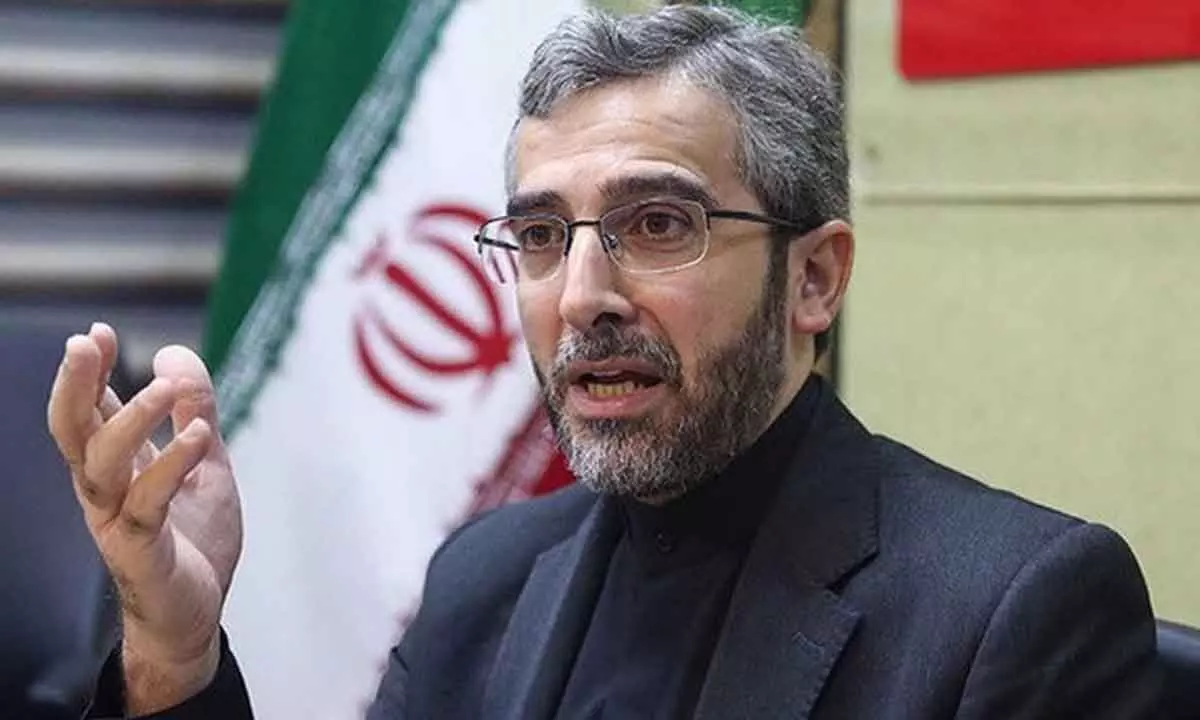Iran, India complete each other: Iranian Deputy Foreign Minister Ali Bagheri

Iranian Deputy Foreign Minister Ali Bagheri
India-Iran commercial ties were traditionally dominated by the Indian import of Iranian crude oil. In 2018-19 India imported USD 12.11 billion worth of crude oil from Iran.
However, following the end of the Significant Reduction Exemption (SRE) period on May 2, 2019, India has suspended importing crude from Iran. The bilateral trade during 2019-20 was USD 4.77 billion, a decrease of 71.99 per cent as compared to the trade of USD 17.03 billion from 2018-19.
Iran is ready to fulfil the energy needs of India, said Iranian Deputy Foreign Minister Ali Bagheri who is visiting India as part of political consultations between the two countries. "Both countries enjoy different types of cooperation in the economic sphere. They are partners and complete each other --- their economies are complementary. Iran enjoys huge energy resources and thus it can provide energy supplies to India and help contribute to its energy security. India, on the other hand, is a major provider of food staples. It can contribute to the food security of Iran," Bagheri said.
Prior to US sanctions on Iran's oil, Iran was significantly one of the major suppliers of oil to India. The Indian government stopped oil imports from Iran in 2019. India-Iran commercial ties were traditionally dominated by the Indian import of Iranian crude oil. In 2018-19 India imported USD 12.11 billion worth of crude oil from Iran. However, following the end of the Significant Reduction Exemption (SRE) period on May 2, 2019, India has suspended importing crude from Iran. The bilateral trade during 2019-20 was USD 4.77 billion, a decrease of 71.99 per cent as compared to the trade of USD 17.03 billion from 2018-19.
Stressing the historical ties between the two countries the Iranian minister said that close cooperation between Iran and India would strengthen the infrastructures for multilateralism in the international system. "There are different areas of cooperation between Tehran and Delhi in order to engage in economic cooperation. Apart from the bilateral economic cooperation, we can hold extensive cooperation in terms of helping the other countries, especially in our region," Bagheri said.
In light of the fall of the Afghanistan government and the ongoing Russia-Ukraine crisis, the minister said that both India and Iran can play an active role in regional cooperation with their neighbours in the central, south and west Asian regions. "Both economies enjoy economic and technological capacities. They can help countries in the region. In particular, Afghanistan after the pullout of US and NATO forces from the country," he said.
He also berated the US and other Western powers for imposing sanctions on three major oil suppliers Iran, Russia, and Venezuela. "By these actions, they have played a key role in destabilising the energy security of the world." Iran India's relations with Iran are unique and historic. Iran is an important partner and a close neighbour. Last year, there was an intensification in bilateral engagement. EAM visited Tehran twice and held constructive meetings with the Iranian leadership.
The two countries continued their engagement in the field of healthcare, and a meeting of the Joint Working Group (JWG) on Health was held in April 2021. India gifted Covid-19 vaccines to Iran, for Afghan refugees sheltered there. Regional connectivity cooperation continued, including the development of Shahid Behesti Terminal, Chabahar Port, along the International North South Transport Corridor (INSTC).
External Affairs Minister S Jaishankar on Wednesday met with Iran's Deputy Foreign Minister Ali Bagheri and discussed bilateral cooperation and the Joint Comprehensive Plan of Action (JCPOA). Taking to Twitter, Jaishankar said, "Pleased to receive Iranian Deputy Foreign Minister for Political Affairs @Bagheri_Kani Discussed our bilateral cooperation, regional issues, and JCPOA."
Indian exports to Iran between 2011-12 and 2019-20 have grown by 45.60 per cent. India's major exports to Iran include rice, tea, sugar, soya, medicines/pharmaceuticals, man-made staple fibres, electrical machinery, etc. Major imports from Iran include inorganic/organic chemicals, fertilizers, cement clinkers, fruits and nuts, leather, etc. Both countries are negotiating a Preferential Trade Agreement, on which five rounds of talks have been held so far.
India is developing the 1st phase of Shahid Beheshti Port at Chabahar. The capacity of the port will reach 8.5 MT at the end of the first phase. During the visit of Prime Minister Narendra Modi to Tehran in May 2016, the contract on the Shahid Beheshti port of Chabahar was signed which, inter-alia, comprises an investment of USD 85 million for procuring equipment for the port.
















